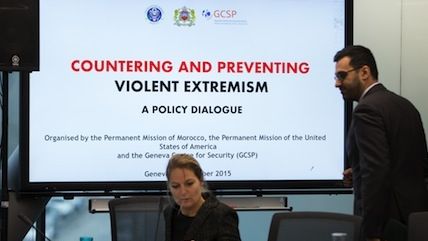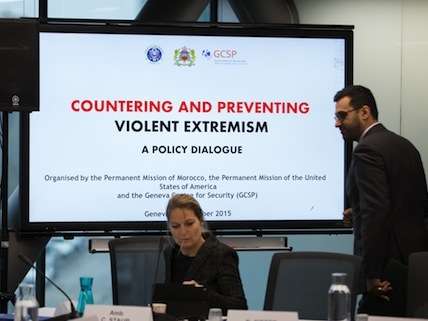Don't Rebrand the 'Countering Violent Extremism' Program—Just End It
The question shouldn't be which groups the program ought to target. It's whether the program should exist at all.


For the Southern Poverty Law Center, the move suggests that "President Trump wants the government to stop its efforts to prevent terrorism by far-right extremists." For Jezebel, it's "another victory in a long series of wins for Neo Nazis, the KKK, and other violent and terroristic groups." Salon calls it "pandering to white supremacists." The target of their ire: a plan to rebrand the federal government's Countering Violent Extremism (CVE) program. According to Reuters, which cites "five people briefed on the matter," the Trump administration wants to rename it "Countering Radical Islamic Extremism," or maybe just "Countering Islamic Extremism," and to focus its attention on Muslim terrorists rather than the various domestic right-wing kinds.
In practice, CVE's efforts are already focused overwhelmingly on Muslims. But the big question here shouldn't be which groups ought to be the program's targets. It's whether the program should exist at all. No matter whether it's aimed at Islamists, white nationalists, or anyone else, the CVE approach has two big problems.
First: It rests on the idea that the best way to root out terrorism is to fight "radicalization." This idea has support among both Democrats and Republicans, but the evidence supporting it is sparse. When investigators at the British think tank Demos (not to be confused with the U.S.-based liberal group of the same name) spent two years studying the differences between violent and nonviolent radicals, they found that while nonviolent radicalism can be a stepping stone to terrorism, it can draw people away from terrorism too. Meanwhile, there were other forces pulling people into terrorism that didn't have much to do with ideology at all. Other probes have reached similar conclusions. So the focus here is all wrong: Radical ideas do not usually lead to violent tactics, and violent tactics do not emerge only from radical ideas.
Second: That focus can lead to some serious civil liberties problems. "Even though the agencies running the programs promised that they wouldn't use CVE for intelligence purposes (as they did in earlier iterations of it), the program itself is designed to teach community members, teachers, police, social workers, and religious leaders to identify and report to law enforcement people showing signs of 'radicalization,'" comments Michael German, a former FBI agent who now hangs his hat at the Brennan Center for Justice. So in practice, he argues, you get "soft surveillance," and that surveillance "is intended to suppress ideas, which is likely to cause more problems than solve them. It encourages the identification, reporting, and 'treatment' of people with bad ideas, which will only lead to misuse of security resources and deprivation of civil liberties."
Needless to say, that sort of surveillance can itself radicalize people. So CVE also runs the risk of contributing to the very process it's meant to stop.
Rebranding "Countering Violent Extremism" as "Countering Radical Islamic Extremism" won't solve any of these issues. Indeed, it could conceivably make the effort even less effective. (German points out that the new name could alienate many of the Muslim groups whose cooperation the program relies on, since they could construe it as a sign the program is "antagonistic to the community.") But neither would it be a good idea to expend more CVE attention on the radical right; all the same problems would be in place there too. Better to drop the approach. End it, don't mend it.


Show Comments (48)